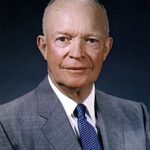President Eisenhower faced his greatest domestic crisis in September 1957. Arkansas Governor Orval Faubus defied federal court orders by blocking nine Black students from entering Little Rock Central High School. The Little Rock Nine integration crisis tested the limits of federal authority versus states’ rights.
The Federal Response
Eisenhower initially sought compromise through private negotiations with Faubus. When Arkansas National Guard troops continued blocking the students, the president took unprecedented action. He federalized the Arkansas National Guard on September 24, 1957. ⚖️ This bold move removed state control over the troops immediately.
Military Intervention
The president deployed 1,000 paratroopers from the 101st Airborne Division to Little Rock. Federal troops escorted the Little Rock Nine students into the school building. This marked the first time since Reconstruction that federal forces enforced civil rights in the South. 📊 The operation demonstrated unwavering presidential commitment to constitutional law and Supreme Court decisions.
Impact:
The Little Rock Nine integration crisis transformed federal civil rights enforcement permanently. Eisenhower’s decisive action established crucial precedent for presidential intervention in civil rights matters. The crisis demonstrated that federal law superseded state resistance to desegregation.
Constitutional Precedent
The president’s use of federal troops validated the Supreme Court’s Brown v. Board decision. This action strengthened federal authority over civil rights enforcement nationwide. 🌍 International observers praised America’s commitment to racial equality during the Cold War era. The intervention enhanced America’s moral standing globally.
Long-term Civil Rights Impact
Eisenhower’s Little Rock decision emboldened future civil rights leaders and activists. The precedent supported subsequent federal interventions during the civil rights movement. 🔥 Southern resistance continued, but federal resolve was clearly established. The crisis marked a turning point in presidential leadership on racial justice.
Political Legacy
Historians consistently rank this decision among Eisenhower’s most important presidential acts. The intervention demonstrated that constitutional principles transcended political considerations. Federal protection of civil rights became an accepted presidential responsibility thereafter.
